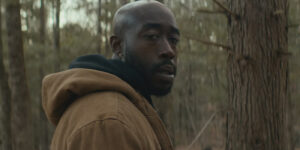Down with the King (2021) review
Dir. Diego Ongaro
By: Steve Pulaski
Rating: ★★★★
The idea of placing a gangster rapper in the wilderness sounds like a Funny or Die sketch on paper, even more-so when said rapper is Freddie Gibbs.
Gangsta Gibbs is (and has been) one of the best rappers in the game for over 10 years now. He’s someone who has spent the last several years collaborating with some of hip-hop’s most respected producers — Madlib, The Alchemist — and, on countless tracks, demonstrated simultaneously cut-throat and buttery smooth line-delivery in the process. His mixtape, Baby Faced Killa, ranks as one of my all-time favorite projects of the genre.
Down with the King, the Gary, Indiana native’s debut as an actor, should’ve been a lot bigger than it was. Even Freddie Kane devotees are unaware of its existence. An extremely limited engagement followed by a low-key VOD release left it in utter obscurity, which is a real shame. Had I seen this film in 2021, it would’ve made my list of favorite films that year.

Gibbs’ first venture into film is an unparalleled cinematic debut for a rapper, as far as I’m concerned. He stars as Money Merc, a hip-hop artist in the midst of a serious career crisis. He dreamt of a life where he could make music and leave the streets behind. But he’s come to the realization that his lyrics and lifestyle have brought him “10 times closer” to the thing from which he was trying to distance himself all along.
Diego Ongaro’s film opens with Merc having relocated to the Berkshires, a secluded New England enclave. His pesty manager (David Krumholtz) assumes he’s working on material for a contractually obligated album, when in reality, Merc is doing the exact opposite. He’s actually enjoying the solitude of the simple life. He relishes mundane trips to the hardware store. He befriends a local named Bob (real-life farmer/logger Bob Tarasuk) and learns how to butcher hogs and feed pigs. The hillside offers the tranquility and the safety he didn’t realize he needed.
But the realities of the world, coupled with his career, creep into his mind, with these asides merely punctuating his own disillusionment. “Merc” is short for “Mercury,” the name his mother gave him. She took it from the Roman God of Speed, a fast-moving deity known for his transactional nature. A plaster statue of Mercury resides with him in his rustic vacation-house; a postmodern piece of art portraying the God talking on a “trap phone” in one hand with a recording device in the other. The statue’s entire torso, and his penis, are naked, vulnerable, his weakness on display for all to see.

Mercury, the person, isn’t so sure that he’ll continue to be “Money Merc” when he returns home. One evening, he sends a tweet signaling his retirement. This horrifies his manager, whose twitchy and desperate demeanor suggests a man running low on funds and in need of his client to perform a big concert in order to bolster his bank account. But life slows down even more for Merc once he meets Michaele (Jamie Neumann), who works at the aforementioned hardware store and is contemplating leaving what she perceives as a dead-end life to attend college in Louisiana.
Ongaro, a French native who now lives in the New England area, affectionately handles Money Merc’s situation. His impressionistic stylings seem to take a page out of Gus Van Sant’s “Death Trilogy.” He’s dutiful in his approach. This is a story about a man striving for what he always wanted, and is just now realizing the path he’s on could be a dead-end. “It’s a young n****’s game right now,” Merc tells his manager at one point, referring to the hip-hop industry. Venomous lyrics lead to drive-by shootings and carnage. In another scene, Merc tells Michaele that rap is the only genre of music where you’re life is at risk. If he made country music, he wouldn’t have to worry about doing a show in violent hotbeds such as Chicago or Detroit.
At the time of its production and release, Freddie Gibbs was in the middle of working on his album, Alfredo. Perhaps he treated the film as the escape for which he longed. It’s hard not to see this story as a semi-autobiographical work for Gibbs. Ongaro doesn’t look for easy answers, nor does he succumb to turning the story of a very Black man in a very white locale into a tone-deaf fish out of water farce. Race is addressed at several points, but the film itself is not a racial parable, at least not at its core. In fact, the way Bob — Tarasuk was the muse of Ongaro’s previous feature, Bob and the Trees — welcomes Merc and agrees to show him the nuances of farm-life is quite wholesome.

Gibbs fans will be treated to him rapping at various points and more than a handful of hilarious moments. He has such a natural gift of both free-spirited charisma and gentle introspection. There’s nary a scene more reflective of Gibbs’ exuberance than when he’s feeding a crop of pigs day-old bread and Hostess cakes. “Oink, motherfucker, oink!,” he yells while galloping around the muddy field, spilling goods for the beasts to eat. There’s another scene of him freestyling some lines on a cliff, in effort to compose a new track, while eating a gas station sandwich. The scene ends with him remarking how good the sandwich is, to no one but himself. It’s beautifully innocent, and we all know the hip-hop lifestyle doesn’t provide those kinds of moments very often.
Among so many beautiful attributes — be it the well-paced story by Ongaro, Gibbs, and Xabi Molia, or the overcast northeastern cinematography by Daniel Vecchione — Down with the King‘s unhurried pace might be my favorite thing about it. It’s so patient with Money Merc, and frequently allows him to exist. Whether he’s silently taking in the crisp New England air in a lush fur-coat, or spending an afternoon with Micheale by the water, he remains interesting due to how debased yet alive he is. Gibbs is an understated screen presence. That feat isn’t so surprising when you consider even at his most impassioned on any given track, he retains a cool, almost laconic flow. The same characteristics spill over to Down with the King, a banger of a film.
NOTE: As of this writing, Down with the King is available to rent on a variety of VOD platforms.
My review of Bob and the Trees
Starring: Freddie Gibbs, Bob Tarasuk, Jamie Neumann, David Krumholtz, Sharon Washington, and Carl Volz. Directed by: Diego Ongaro.
About Steve Pulaski
Steve Pulaski has been reviewing movies since 2009 for a barrage of different outlets. He graduated North Central College in 2018 and currently works as an on-air radio personality. He also hosts a weekly movie podcast called "Sleepless with Steve," dedicated to film and the film industry, on his YouTube channel. In addition to writing, he's a die-hard Chicago Bears fan and has two cats, appropriately named Siskel and Ebert!


